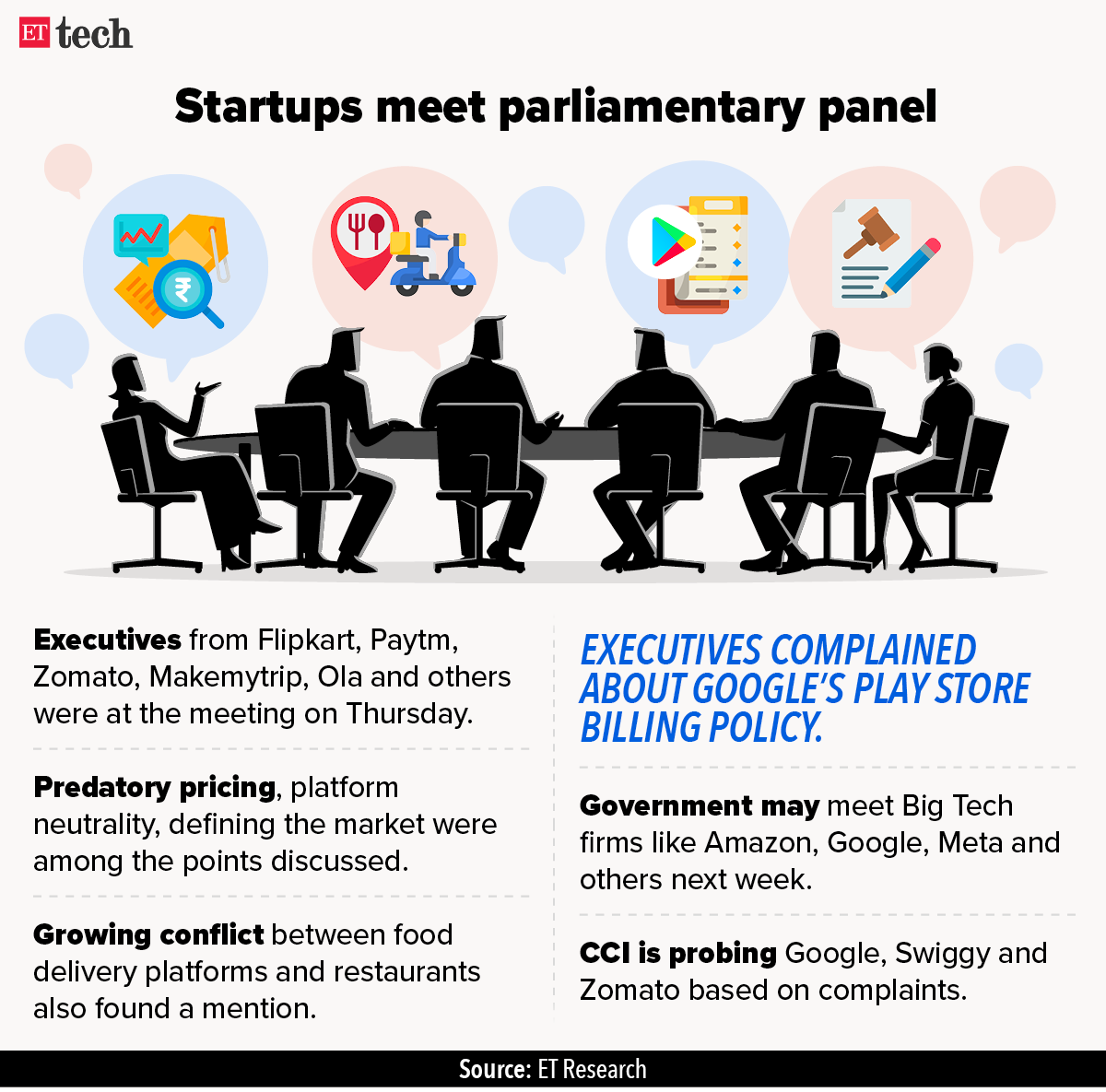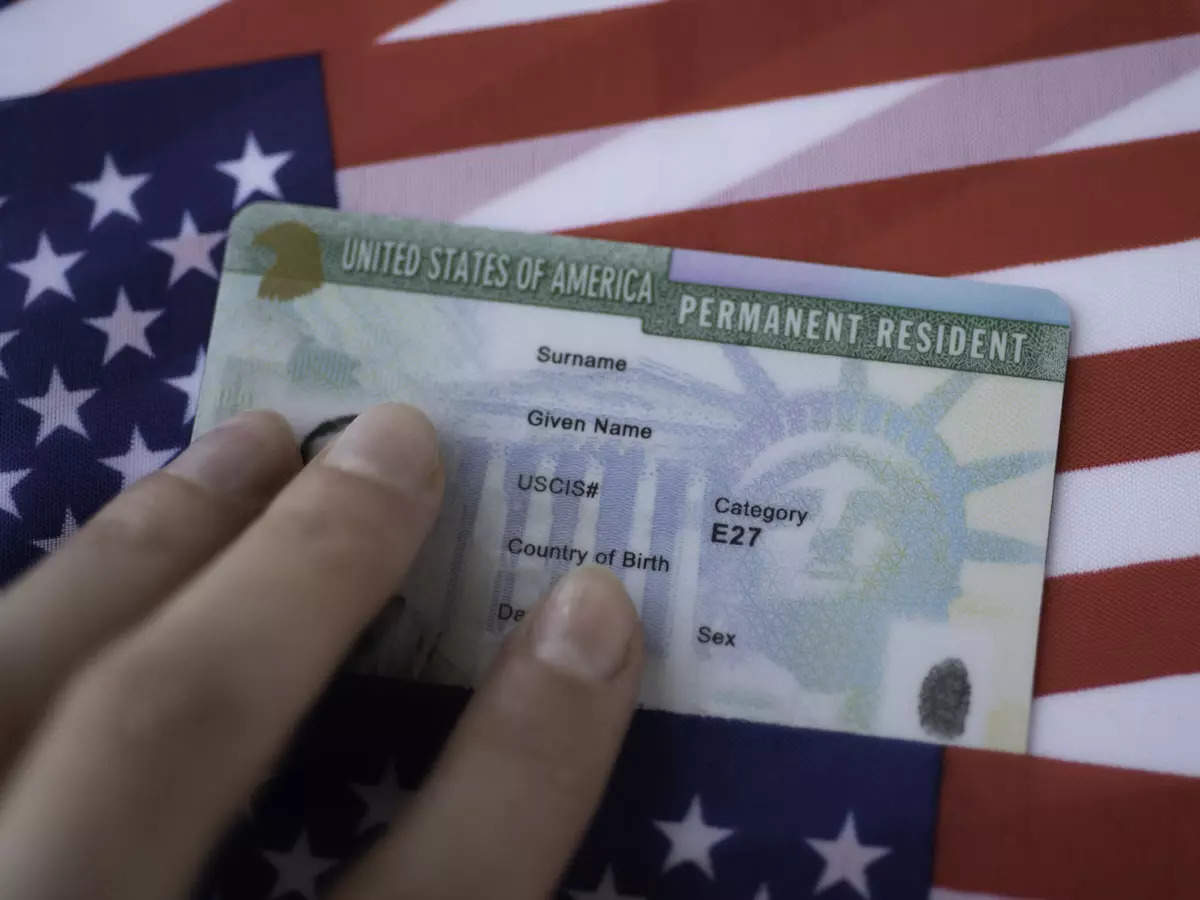Also in this letter:
■ Global investors of gaming firms ask FM for status quo on GST
■ IT firms may rationalise real estate in big cities
■ Disney Star bags Cricket Australia media rights for $280 million
Lawmakers discuss predatory pricing, regulations and more with Indian tech firms
Top executives, startup founders and CEOs of Indian internet firms including Flipkart, Paytm, Oyo Hotels & Homes, Ola, Zomato, Swiggy, Makemytrip and others met a high-powered parliamentary panel headed by former minister of state for finance Jayant Sinha of the BJP on Thursday to discuss ‘anti-competitive practices by Big-tech companies’.
What was discussed? The three-hour, closed-door meeting between the industry and the parliamentarians touched upon a series of hot-button topics that technology firms have grappled with globally amid fears of their unchallenged power.
Issues ranging from predatory pricing to platform neutrality were discussed in the backdrop of potential regulations for the sector.
The role of user data, regulations and how to define the market for these emerging internet businesses were some of the topics discussed, with parliamentarians getting the views of the industry on these subjects, said another source.
Complaints: Executives also shared their misgivings about US technology giants such as Google and its contentious Play Store billing policies.
Startups have long complained about Google’s billing policy, under which platforms have to pay a 30% fee to Google for in-app purchases.
Its implementation has been postponed to October 31, 2022 in India after a backlash from app developers.
We reported on March 31 that the Competition Commission of india (CCI) found Google’s billing system was ‘unfair and discriminatory’.

Foreign firms next: A similar meeting with the Committee on Finance is expected to be held next week for international tech firms including Amazon, Google, Meta, Twitter, sources said.
Global investors of gaming firms ask FM for status quo on GST
.jpg)
Over a dozen global venture capital investors in Indian gaming startups have urged the government to retain the current goods and services tax (GST) of 18% levied on gross gaming revenue (GGR) instead of on total deposits.
This comes amid widespread concerns that the GST Council is considering a tax on the latter.
Over the past few years, there has been a debate on whether taxes should be applicable on the total transaction value or the net commissions (revenues) or what is called GGR.
Big names, big money: The investors sent a joint representation to finance minister Nirmala Sitharaman on July 10. The letter was signed by Navroz Udwadia, cofounder of Alpha Wave Global; Rajan Anandan, managing director, Sequoia Capital India; and Dan Sundheim, founder, D1 Capital Partners, among others.
These investors have backed gaming unicorns like Dream Sports, Mobile Premier League, and Games24X7. The Indian gaming market is currently valued at over $10 billion.
Killer tax: The investors said revising the tax structure to 28% on total deposits, or contest entry amount, instead of gross gaming revenue, or platform fees, could make the business model of legitimate operators unviable and lead to a proliferation of illegal operators.
What’s next? According to an industry source, a meeting has been scheduled for July 23 between the Group of Ministers and industry stakeholders to finalise the recommendation before a final report is submitted to the GST Council, which is headed by the finance minister.
The final recommendations on tax slabs and structures will be decided in the meeting, the source added.
ETtech Ecommerce Index
We’ve launched three indices – ET Ecommerce, ET Ecommerce Profitable, and ET Ecommerce Non-Profitable – to track the performance of recently listed tech firms. Here’s how they’ve fared so far.
IT firms may rationalise real estate in big cities as small towns take centre stage

Some Indian and global IT companies are looking to rationalise their real estate in large cities even as others go slow on or entirely halt their expansion in metros. They are looking to expand aggressively into tier II and III cities to tap workers who moved back to their hometowns during the pandemic, company executives and analysts told us.
Who’s doing what: Tech Mahindra is consolidating and rationalising its campuses to make way for small-town centres while converting larger facilities into experience centres for customers and flexible workstations for employees, Jagdish Mitra, chief strategy officer and head of growth at Tech Mahindra said.
The company has been expanding rapidly in cities like Chandigarh, Vijayawada, and Warangal to be closer to its employee base.
TCS is not giving up any existing real estate but opening eight new campuses in small towns.
HCL Tech, India’s third largest software services firm by revenue, also focused on expanding in small towns.
TWEET OF THE DAY
Disney Star bags Cricket Australia media rights for seven years for $280 million

Disney Star has outbid Sony Pictures Networks India (SPN) to pick up media rights of Cricket Australia (CA) for the next seven years for around $280 million, a person directly aware of the development said.
This includes both television and digital rights, as well as clips and other footage, for the Indian subcontinent.
The Australian cricket board is likely to make an official announcement this week.
The deal will also include Big Bash League, the homegrown T20 format league of Australia, as well as women’s tournaments.
The news comes a month after Disney Star secured the TV rights of the Indian Premier League (IPL) for the next five years by bidding Rs 57.5 crore per match, or Rs 23,575 crore.
Green card wait time likely to remain long for Indian applicants

The wait for green cards for Indian applicants is likely to remain long, with 369,322 applicants having approved employment visa petitions awaiting visa availability, according to recent data from the US immigration agency.
Almost all of these are applicants under the EB2 and EB3 (for professionals and skilled workers) categories, used by technology companies to sponsor visas for immigrant workers. The green card, or permanent residence, option is available on these visas.
These applicants have an approved Form 1-140 which is the first step towards an employment-based green card. “After an I-140 is approved, employment-based applicants who are Indian-born usually have to wait several years for their priority dates to become current. After the dates become current, the final step of the green card, the issuance of the immigrant visa, can further take several years because of the USCIS processing delays,” said Rajiv S Khanna, managing partner at immigration.com.
Other Top Stories By Our Reporters

Bounce to sell electric scooters on Flipkart: Electric scooter maker Bounce will start selling its Infinity scooters on Flipkart from July 22. Bounce will deliver the scooters to customers within 15 days of booking. Initially, customers from New Delhi, Gujarat, Karnataka, Telangana, and Maharashtra will be able to access the product on Flipkart.
Former TCS CFO V Ramakrishnan passes away: Former TCS chief financial officer Venkatraman Ramakrishnan passed away aged 65 in Bengaluru on Thursday morning following a heart attack. He is survived by his wife Bhavani Ramakrishnan and daughter Madhuri Ramakrishnan.
Auxano Capital to raise $25M: Early-stage venture capital (VC) firm Auxano Capital is raising $25 million for Indian startups through its network of high-net-worth individuals (HNIs), ultra-high-net-worth individuals (UHNIs), and family offices. It aims to achieve the fund’s first close by the end of this quarter and has been proceeding accordingly.
Global Picks We Are Reading
■ Fleeing Putin, Russian tech workers find a home in Armenia (Rest of World)
■ Facebook forsakes friends and family to compete with TikTok (The Washington Post)
■ Amazon is buying ‘membership-based’ healthcare provider One Medical for $3.9 billion (The Verge)
























